Books by Frithjof Schuon
The Transcendent Unity of Religions
Spiritual Perspectives and Human Facts
Gnosis: Divine Wisdom
Language of the Self
Stations of Wisdom
Understanding Islam
Light on the Ancient Worlds
In the Tracks of Buddhism
Treasures of Buddhism
Logic and Transcendence
Esoterism as Principle and as Way
Castes and Races
Sufism: Veil and Quintessence
From the Divine to the Human
Christianity/Islam: Essays on Esoteric Ecumenicism
Survey of Metaphysics and Esoterism
In the Face of the Absolute
The Feathered Sun: Plains Indians in Art and Philosophy
To Have a Center
Roots of the Human Condition
Images of Primordial and Mystic Beauty: Paintings by Frithjof Schuon
Echoes of Perennial Wisdom
The Play of Masks
The Transfiguration of Man
The Eye of the Heart
Form and Substance in the Religions
Edited Writings of Frithjof Schuon
The Essential Writings of Frithjof Schuon, ed. Seyyed Hossein Nasr
The Fullness of God: Frithjof Schuon on Christianity, ed. James S. Cutsinger
Prayer Fashions Man: Frithjof Schuon on the Spiritual Life, ed. James S. Cutsinger
Art from the Sacred to the Profane: East and West ed. Catherine Schuon
World Wheel
Volumes IV-VII
2006 World Wisdom, Inc.
All rights reserved.
No part of this book may be used or reproduced
in any manner without written permission,
except in critical articles and reviews.
Library of Congress Cataloging-in-Publication Data
Schuon, Frithjof, 1907-1998.
[Poems. English. Selections]
World wheel, volumes IV-VII : poems / by Frithjof Schuon ; foreword by Annemarie Schimmel ; introduction by William Stoddart.
p. cm. --(Writings of Frithjof Schuon series) (Library of perennial philosophy)
Translated from the German.
Includes bibliographical references and index.
ISBN-13: 978-1-933316-31-4 (pbk. : alk. paper)
ISBN-10: 1-933316-31-4 (pbk. : alk. paper) 1. Schuon, Frithjof, 1907-1998--Translations into English. 2. Religious poetry, German-20th century. I. Schimmel, Annemarie. II. Stoddart, William. III. Title.
PT2680.U474A2 2006c
831.914--dc22
2006030904
Cover photo: Frithjof Schuon
Printed on acid-free paper in Canada
For information address World Wisdom, Inc.
P.O. Box 2682, Bloomington, Indiana 47402-2682
www.worldwisdom.com
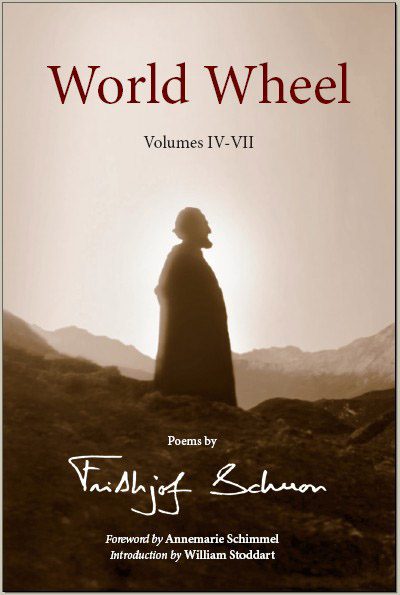
Foreword
It seems that mystical experience almost inevitably leads to poetry. The great mystics all over the world used the language of poetry when trying to beckon to a mystery that lies beyond normal human experience, and the most glorious works in Eastern and Western religions are the hymns of the mystics, be they Sufis or Christians, Hindus or Zen monks. Different as their expressions are, one feels that the poetical word can more easily lead to the mystery that is hidden behind the veils of intellectual knowledge and which cannot be fettered in logical speech.
In the world of Islam, the love-intoxicated poems of Maulana Jalaladdin Rumi are considered by many to be the Koran in the Persian tongue, and Rumi is only one of many intoxicated souls who expressed their love and longing, and their experience of the Divine Unity, in verse. And even those mystics who preferred a more intellectual approach to the Absolute couched their experiences in verse. The prime example is, of course, Ibn Arabi whose Tarjuman al-ashwaq translated his experience of the One, Unattainable Deity into the language of traditional Arabic poetry.
Taking this fact into consideration we are not surprised that Frithjof Schuon too felt compelled to write poetryand, it is important to note, poetry in his German mother tongue. His verse sometimes reflects ideas and images of R. M. Rilkes Stundenbuch, in which the expert on mysticism can find some strange echoes of Ibn Arabis ideas. This may be an accident, for mystical ideas are similar all over the world; but the German reader of Schuons verses enjoys the familiar sound. This sound could not be maintained in the English translations of his poetry. Yet, as he himself explains, what really matters is the content, and here we listen to the thinker who, far from the intricate and complex scholarly sentences of his learned prose works, sings the simple prayers of the longing soul: God is the center, the primordial ground which comprehends everything, manifesting Himself through the colorful play of His creations. And it is the human heart which alone can reflect the incomprehensible Being, for humanitys central quality is divinely inspired love, which is the axis of our life.
I hope that Schuons mystical verse will be read not only by English speaking readers but even more by those who understand German.1 They will enjoy many of these tender lyrics which show the famous thinker in a very different light and from an unexpected side.
Annemarie Schimmel, Professor Emeritus, Harvard University
Footnotes
- See Translators Note on page xvi.
Index of Foreign Quotations
Adona Elohenu, Adona Ehat (Hebrew): The Lord our God, the Lord is One
 (Arabic): God is generous
(Arabic): God is generous
Alt Heidelberg, du Feine (German): Old Heidelberg (old city in South Germany), you beautiful one
Beaut oblige (French): Beauty obliges
Bni soit son saint Nom (French): Blessd be His Holy Name
Brahma Satyam (Sanskrit): God is real
Brahma Satyam; jagan  (Sanskrit): God is real, the world is appearance.
(Sanskrit): God is real, the world is appearance.
Cuando Dios quiere (Spanish): When God wills
Deo gratias (Latin): Thanks be to God
Errare humanum est; perseverare diabolicum (Latin): To err is human, but to persevere in error is diabolic (Seneca the younger); Humanum fuit errare, diabolicum est per animositatem in erroremanere: To err was human but to remain in error because of passion is diabolic (St. Augustine, Sermon 164, 14)
Frihet garutfron den ljungande Pol (Norwegian): Freedom comes from the thunderous pole .
 as t (Persian): It is here
as t (Persian): It is here
Il nome del bel Fior chio sempre invoco (Italian): The name of the fair flower that I always invoke. From Dantes Divina Commedia, Paradiso XXIII.88
Insignifiant est ce quon exagre (French): What one exaggerates loses its meaning
 (Arabic):There is no divinity but God
(Arabic):There is no divinity but God
Le coeur qui tend vers Dieu, na rien craindre (French): The heart which turns to God has nothing to fear
Le franais dfinit; lallemand veut peindre / Dans lEsprit les gnies devraient se joindre (French): French defines, German seeks to paint, the geniuses [of the two languagues] combine in the Spirit
Ma gi volgeva il mio disio el velle / S come rota chigualmente mossa / Lamor che muove il sole e laltre stelle (Italian): But now my desire and will were turned / like a wheel that is evenly moved, / by the Love that moves the sun and the other stars. From Dantes Divina Commedia, Paradiso XXXIII.143-145
Ma per trattar del ben chio vi trovai, / Dir de laltre cose chio vho scorte (Italian): But in order to treat of the good that I found there, / I will speak of other things that I saw. From Dantes

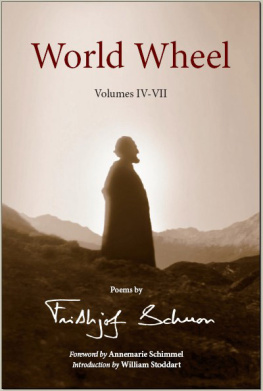

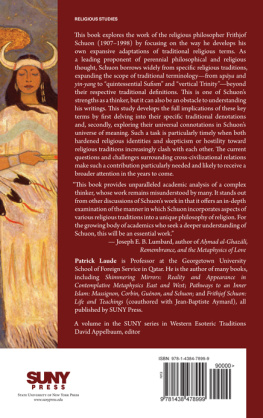

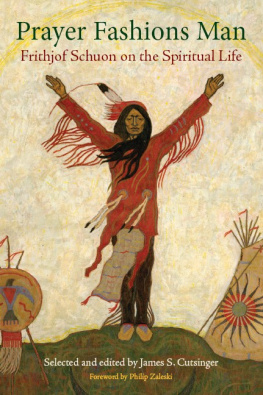
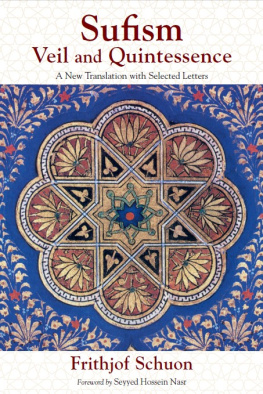
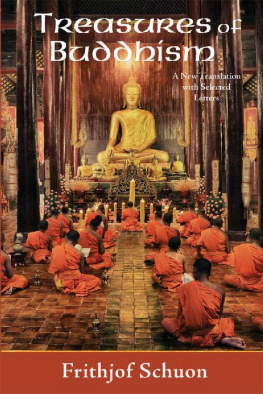
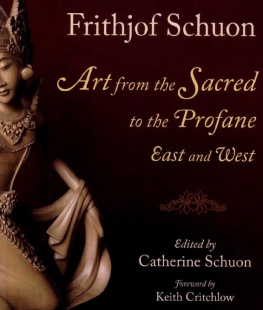
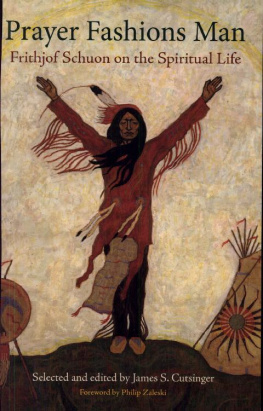
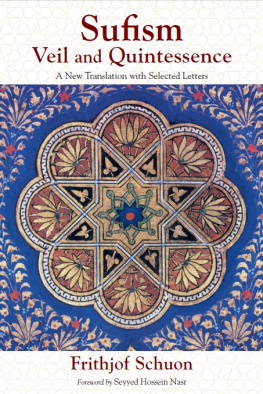
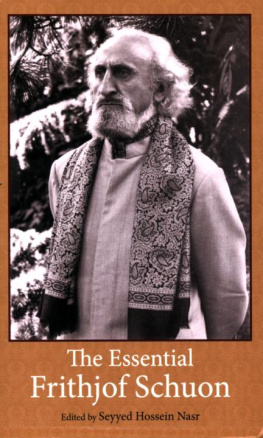

 (Arabic): God is generous
(Arabic): God is generous (Sanskrit): God is real, the world is appearance.
(Sanskrit): God is real, the world is appearance. as t (Persian): It is here
as t (Persian): It is here (Arabic):There is no divinity but God
(Arabic):There is no divinity but God